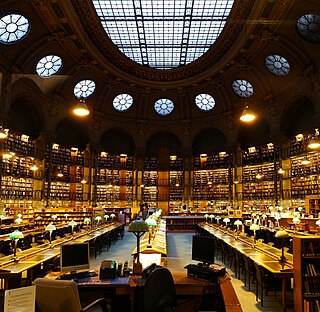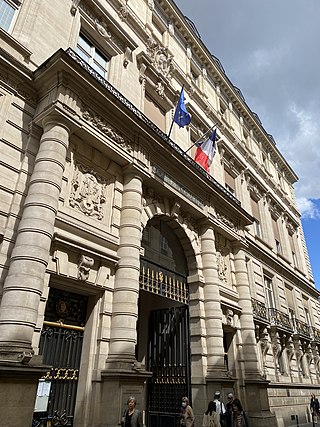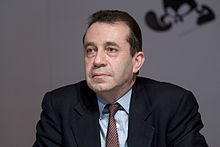
The Bibliothèque nationale de France is the national library of France, located in Paris on two main sites known respectively as Richelieu and François-Mitterrand. It is the national repository of all that is published in France. Some of its extensive collections, including books and manuscripts but also precious objects and artworks, are on display at the BnF Museum on the Richelieu site.

Jean-Barthélemy Hauréau was a 19th-century French historian, journalist and administrator.
Raoul Vaneigem is a Belgian writer known for his 1967 book The Revolution of Everyday Life.

Jules Régis Debray is a French philosopher, journalist, former government official and academic. He is known for his theorization of mediology, a critical theory of the long-term transmission of cultural meaning in human society, and for associating with Marxist revolutionary Che Guevara in Bolivia in 1967 and advancing Salvador Allende's presidency in Chile in the early 1970s. He returned to France in 1973 and later held various official posts in the French government.

Ferdinand Jules Quénisset (1872–1951) was a French astronomer who specialized in astrophotography.

The Cour des Comptes is France's supreme audit institution, under French law an administrative court. As such, it is independent from the legislative and executive branches of the French Government. However, the 1946 and 1958 French constitutions made it the Court's duty to assist the Cabinet and Parliament in regulating government spending. The Court thus combines functions of a court of exchequer, comptroller general's office, and auditor general's office in common-law countries. It is also a Grand Corps of the French State and mainly recruits among the best-ranked students graduating from the Ecole nationale d'administration.
The grands établissements are French public institutions under ministerial charter under the administrative category referred to as Établissements publics à caractère scientifique, culturel et professionnel (EPCSP).

Rachid Mimouni was an Algerian writer, teacher and human rights activist.
Pierre Brochand is a former director of the French Directorate-General for External Security (DGSE). He was previously a diplomat. He was a witness to Operation Frequent Wind and the Fall of Saigon in April 1975 at the end of the Vietnam War.
The grands corps de l'État are a feature of the French state as envisaged in the reforms of Jean-Baptiste Colbert. Some of these grands corps date back to the reign of Louis XV, in the 18th century, but most originated or were given their modern form during the reign of Napoleon.
Robert Miguet is a French civil servant.
Louis Carolus-Barré was a 20th-century French librarian and medievalist.
Madeleine Laurain-Portemer was a 20th-century French historian, specializing in the history of Mazarin and his time, married to Jean Portemer (1911-1998).

Jean-Michel Leniaud is a French historian of art. A specialist of architecture and art of the 19th and 20th centuries, he was director of the École Nationale des Chartes from 2011 to 2016. He is president of the Société des Amis de Notre-Dame de Paris.
Jean Bounine-Cabalé was a French businessman and consultant. He wrote several economic books.

Gilles Cantagrel is a French musicologist, writer, lecturer and music educator.

Francis Rapp was a French medievalist specializing in the history of Alsace and medieval Germany. An emeritus university professor, he was a member of the Académie des inscriptions et belles-lettres since 1993.
Jérôme Salomon is a French infectious diseases physician and high-ranking civil servant. He is the French Directeur général de la Santé since 8 January 2018. He became known in France since the COVID-19 pandemic.
Étienne Taillemite was a French historian and archivist.
Madeleine Jurgens (1919–2022) was a French archivist and historian. Born Madeleine Marie Connat on December 19, 1919 in Créteil, she graduated from the École Nationale des Chartes in 1942. Her thesis focused on the estate inventories of Parisians during the first half of the sixteenth century. She was hired as a curator at the national archives in 1943 and was later promoted to in 1957. She was named an honorary curator in 1984.









